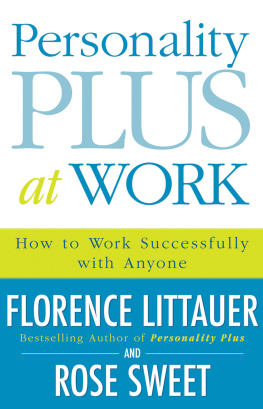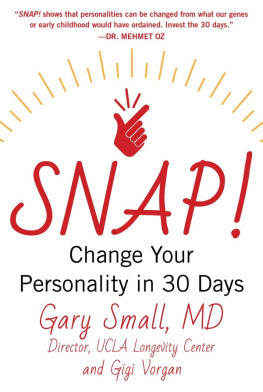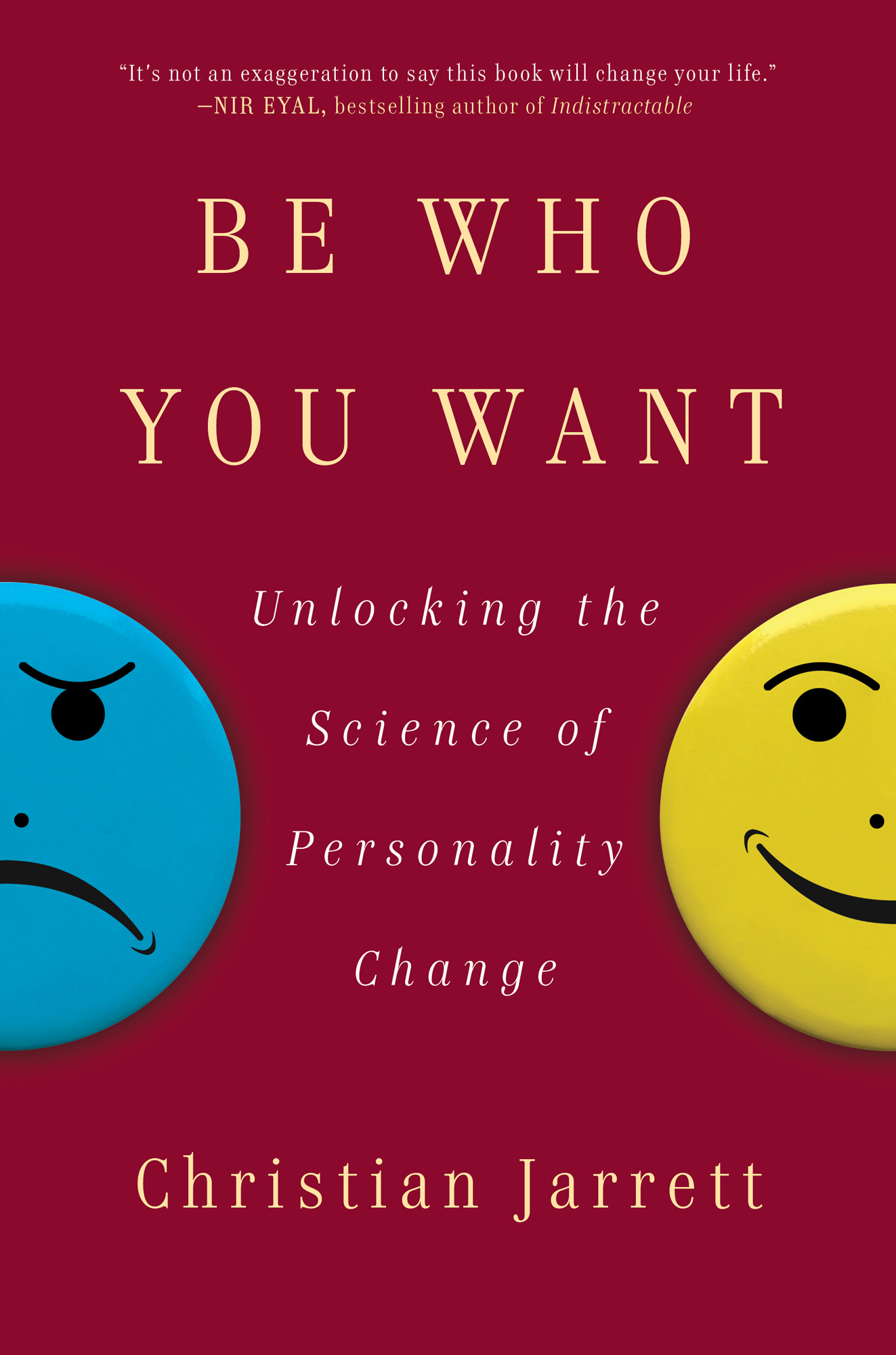Contents
Guide
Its not an exaggeration to say this book will change your life.
NIR EYAL, bestselling author of Indistractable
Be Who You Want
Unlocking the Science of Personality Change
Christian Jarrett

Simon & Schuster
1230 Avenue of the Americas
New York, NY 10020
www.SimonandSchuster.com
Copyright 2021 by Christian Jarrett
All rights reserved, including the right to reproduce this book or portions thereof in any form whatsoever. For information, address Simon & Schuster Subsidiary Rights Department, 1230 Avenue of the Americas, New York, NY 10020.
First Simon & Schuster hardcover edition May 2021
SIMON & SCHUSTER and colophon are registered trademarks of Simon & Schuster, Inc.
For information about special discounts for bulk purchases, please contact Simon & Schuster Special Sales at 1-866-506-1949 or .
The Simon & Schuster Speakers Bureau can bring authors to your live event. For more information or to book an event, contact the Simon & Schuster Speakers Bureau at 1-866-248-3049 or visit our website at www.simonspeakers.com.
Interior design by Ruth Lee-Mui
Jacket design by Tom McKeveny
Library of Congress Cataloging-in-Publication Data
Names: Jarrett, Christian, author.
Title: Be who you want : unlocking the science of personality change / Christian Jarrett.
Description: New York : Simon & Schuster, 2021. | Includes bibliographical
references and index. | Summary: From cognitive neuroscientist Dr.
Christian Jarrett, a fascinating book exploring the science of personality and how we can change ourselves for the better-- Provided by publisher.
Identifiers: LCCN 2020056797 | ISBN 9781501174698 (hardcover) | ISBN 9781501174711 (paperback) | ISBN 9781501174704 (ebook)
Subjects: LCSH: Personality change. | Change (Psychology) | Self-realization.
Classification: LCC BF698.2 .J37 2021 | DDC 155.2/5--dc23
LC record available at https://lccn.loc.gov/2020056797
ISBN 978-1-5011-7469-8
ISBN 978-1-5011-7470-4 (ebook)
For Jude, Rose, and Charlie
Authors Note
Can people ever truly change? In the more than twenty years Ive been writing about psychology and brain science, Ive come to realize that for many people, this is the burning question. Put differently: Can bad people turn good? Can the idle become ambitious? Can a leopard ever change its spots?
Its true that a degree of self-acceptance is psychologically healthy (so long as it doesnt slip into resignation and hopelessness). But I wanted to write a book for those of you who are less interested in feeling good about yourself as you are now and more interested in becoming the best version of yourself that you can possibly be.
Through tales of criminals who transformed their personalities, of shy celebrities who found their voice, of drug addicts who reformed and excelled in new endeavors, combined with the latest compelling research evidence from psychological science, youll learn that people do change, and that, yes, if you want to change yourself, you can. It wont be quick or easy, but its possible.
Your personality will continue to evolve through your life, partly as a natural response to your changing situations and also because of gradual changes in your physiology. Most exciting, there are ways you can take control of this malleability to mold yourself more in line with the person you aspire to be.
This book is filled with tests and interactive exercises to help you better understand the various aspects of your personality, your life story, and your passions. The more you engage with the interactive elements in an honest fashion, the greater the likelihood that you will find out more about yourself and benefit from the insights in the book. Building new habits is a key part of successful personality change, and each chapter concludes with suggestions for new activities to adopt and psychological strategies to try out to help shape your different traits.
There are many notes of caution ahead too. I will tell you about good people turned bad and delve into the sometimes devastating effects of injury and illness on a persons character. In short, your personality is a work in progress. Pursuing the best version of yourself is a philosophy to live by rather than a job to complete.
I hope this book will especially appeal to anyone who has ever felt imprisoned or constrained by the way theyve been characterizedor caricaturedby others. It is a human weakness that we are prone to drawing premature conclusions about one another, often ignoring the influence of circumstances (known in psychology as the fundamental attribution error). If youve ever felt boxed in by other peoples judgments on your personalitylabeled introvert, slacker, softie, snowflake, or whatever else in an overly simplistic wayyou will enjoy learning about the profound effects of circumstances on how personality manifests itself at any given time, how we all tend to change throughout life, and how you can smash out of that box by transforming yourself through new habits and pursuing your true passions in life.
People change. Ive changed. The other day I was clearing out old papers when I came across my teachers reports from when I was a teenager at boarding school. I am not sure how, if at all, Christian can change his naturally placid manner, wrote my personal tutor when I was sixteen years old. I do agree with his tutor, wrote my housemaster in the same end-of-term report: Christians nature and personality do tend to draw comments such as too quiet. My class teachers were unanimous: Too reserved and quiet (geography); I would encourage him to contribute more to class discussion (history); He needs to speak more! (English). My favorite came from my housemaster a year earlier: It is not always easy to tell whether Christians good-natured taciturnity is a sign of diffidence or merely intelligent verbal economy.
But in my freshman year at college, I burst out of my shell, built large groups of friends, and partied all night most nights of the week. I remember my graduation-year dissertation adviser admitting, after I graduated with highest honors, that he had long ago given up on me, having pigeonholed me as a hedonist more interested in sports than learning (based on what he knew of my social life and all my time at the university gym where I worked part-time as a trainer).
Change never ceases. Fast-forward five years or so after graduation, and life was quiet again. With a job working remotely as an editor and writer and living with my then wife-to-be in a rural part of Yorkshire, England, I was back to being an extreme introvert. I had no car, and my wife-to-be was out most days, twenty miles away in the city of Leeds, studying to be a clinical psychologist. It was a textbook example of how circumstances can shape us profoundly. Its tricky to be an extravert when youre working by yourself in a home office in a quiet village. Yet I felt my conscientiousness grow as I became absorbed in the challenge of my first editorial role, and writing about psychology came to feel like my calling. Meeting my deadlines and having the self-discipline to write daily was a pleasure and became part of the rhythm of my life.
In more recent years, Ive felt myself changing again. Im blessed with two beautiful young childrenRose and Charliewho have boosted my conscientiousness still further (What greater calling in life can there be than parenthood?), but I think they may have also increased my neuroticism a point or two!













